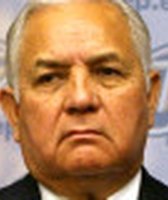Stand up for the facts!
Our only agenda is to publish the truth so you can be an informed participant in democracy.
We need your help.
I would like to contribute
Stephen Colbert welcomed Don McLeroy, a former chairman of the State Board of Education, to his Comedy Central program this week and briefly referenced a familiar claim about Thomas Jefferson in Texas schools.
On his April 23, 2012, show, Colbert said McLeroy had "wanted to remove references to Thomas Jefferson and his importance in the Founding Fathers" from textbooks. "Why was that?" Colbert asked.
"Actually, that’s not true," McLeroy replied.
"No, no, I have personally chosen that it is true," Colbert replied, a parry that drew laughter and applause.
McLeroy did not elaborate on his objection except to say that he was glad Colbert brought up Jefferson.
Colbert’s assertion reminded us of our March 2010 review of a similar claim by Democratic gubernatorial nominee Bill White.
In an email, White blamed GOP Gov. Rick Perry for lackluster leadership at the expense of students' education. "Last week, the Texas State Board of Education (SBOE), led by Rick Perry's appointee, voted to remove Thomas Jefferson from social studies textbook standards," White’s email said. "That's right. Thomas Jefferson — Founding Father, author of the Declaration of Independence, and a world-renowned scholar who advocated democratic, limited government — was deleted from a list of historical figures who inspired political change."
That was not entirely accurate.
In July 2009, the Texas Essential Knowledge and Skills review committee, consisting of seven social studies teachers from different school districts across Texas, recommended revising a high school world history studies course description to include various ideas from the Enlightenment era, an 18th-century period of philosophic thought whose tenets included reason, skepticism and revolution.
The amendment read: "Government. The student understands how contemporary political systems have developed from earlier systems of government. The student is expected to ... explain the impact of Enlightenment ideas from John Locke, Thomas Hobbes, Voltaire, Charles de Montesquieu, Jean Jacques Rousseau, and Thomas Jefferson on political revolutions from 1750 to the present ..." (The review committee noted in its original draft that its suggested list was not meant to be exhaustive.)
Board member Cynthia Dunbar, a lawyer and assistant law professor from Richmond, later made a motion to change the proposed standard, substituting "writings" for "Enlightenment ideas" and removing Jefferson from the suggested list. In Jefferson's place, she added Thomas Aquinas, John Calvin and Sir William Blackstone — respectively, a Roman Catholic priest and saint; a Protestant theologian; and an English jurist who wrote that the doctrines of common law are based on God's word.
Dunbar, defending the amendment, said: "It does take out (the) reference to Thomas Jefferson. But the reason is not that I don't think his ideas were important. It's just that this is a list of political philosophers from which the Founding Fathers based their ideologies and their principles."
Dunbar's amendment won preliminary board approval 8 to 6.
However, the move did not strike Jefferson from Texas classrooms. "The only individual mentioned more times in the curriculum standards than Thomas Jefferson is George Washington," board member Gail Lowe, then the chairwoman, said in a press release at the time.
In fact, members left intact these elements: In a fifth-grade U.S. history course, students are expected to "identify the Founding Fathers and patriot heroes," including Jefferson. In an eighth-grade U.S. history course, students are required to "explain the roles played by significant individuals during the American Revolution," including Jefferson. And in a high school government course, students must "identify the contributions of the political philosophies of the Founding Fathers" and "identify individuals in the field of government and politics," both including Jefferson.
We also pointed out that White’s description of the board’s work as amending "textbook standards" was a little off. The board was actually updating the state's curriculum standards.
Then again, though, the curriculum standards were expected to serve as a framework when the board met to revise textbooks in 2011.
Debbie Ratcliffe, a spokeswoman for the state education agency, told us this week that the state’s request for publishers to submit social studies textbooks was later pushed back to after 2012.
Lists of the historical figures, including Jefferson, who must, or may, be mentioned in the board-adopted Social Studies curriculum for each grade can be downloaded starting here.
Back to White: His email said the board had voted "to remove Thomas Jefferson from social studies textbook standards," but the referenced action concerned one amendment to a single high school world history standard. White’s comment also implied that those standards were already in effect. They weren't.
We rated his multipart email blast as Half True.
Our Sources
See Truth-O-Meter article.



































